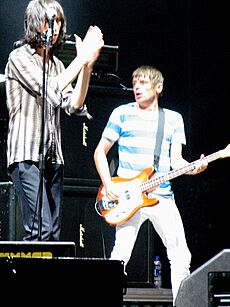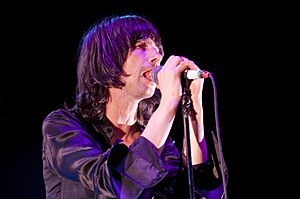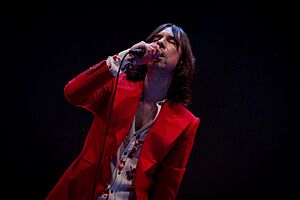Primal Scream facts for kids
Quick facts for kids
Primal Scream
|
|
|---|---|
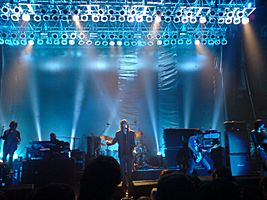
Primal Scream performing in Southampton in 2006
|
|
| Background information | |
| Origin | Glasgow, Scotland |
| Genres |
|
| Years active | 1982–present |
| Labels |
|
| Members |
|
| Past members |
|
Primal Scream is a Scottish rock band that started in 1982 in Glasgow. The band was formed by Bobby Gillespie (singer) and Jim Beattie (guitarist). Today, the band includes Gillespie, Andrew Innes (guitar), Simone Butler (bass), and Darrin Mooney (drums).
Primal Scream began playing live shows in 1982. Their career really started after Gillespie left his other band, The Jesus and Mary Chain, where he was the drummer. In the mid-1980s, Primal Scream was a big part of the indie pop scene.
Later, they changed their style. Their 1991 album, Screamadelica, mixed rock with dance music and made them famous. Since then, the band has tried many different styles, like blues, trip hop, and industrial rock. Their newest album, Come Ahead, came out on November 8, 2024.
Contents
Band History
How Primal Scream Started (1982–1984)
Bobby Gillespie grew up in Glasgow and went to King's Park Secondary School. There, he met friends like Robert Young and Alan McGee. McGee and Gillespie loved punk rock and started a band called the Drains. The band's guitarist was a 15-year-old Andrew Innes. The Drains didn't last long.
After punk rock, Gillespie wasn't excited about the popular music of the time. He and his friend Jim Beattie started making music together. At first, they just made noise with things like dustbin lids and a fuzzy-sounding guitar. Soon, they began playing songs by bands like the Velvet Underground and the Byrds. They named their band Primal Scream, which is a term from a type of therapy.
First Albums and a New Sound (1984–1989)
Gillespie also played drums for the band the Jesus and Mary Chain. He had to choose between that band and Primal Scream. He chose to stay with Primal Scream. The band signed with Creation Records, a record label started by his friend Alan McGee. They released their first single, "All Fall Down," which got good reviews.
The band toured in 1986, but Gillespie wasn't happy with their live shows. They recorded their first album, Sonic Flower Groove, which cost a lot of money to make. The album didn't sell well and got bad reviews. This caused problems in the band, and Beattie and the drummer left.
The band moved to Brighton to start over. With new members, they changed their sound from jangly pop to a harder rock style. They released their second album, Primal Scream. But fans and critics didn't like the new sound.
Screamadelica: The Big Breakthrough (1990–1992)
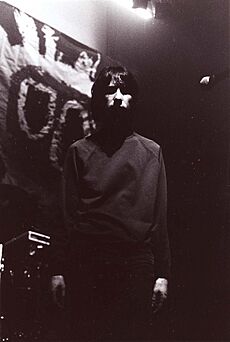
In 1988, the band discovered the acid house dance music scene. At first, they weren't sure about it, but they grew to like it and started going to dance parties called raves. At a rave, they met a DJ named Andrew Weatherall. He remixed one of their songs, "I'm Losing More Than I'll Ever Have."
The new version was called "Loaded". It became a huge hit and reached number 16 on the UK music charts. This success was followed by another hit single, "Come Together."
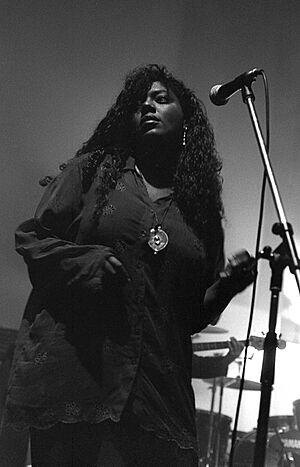
The band went into the studio to record a new album. They worked with producers like Weatherall and Jimmy Miller. Keyboard player Martin Duffy joined the band full-time. The album, Screamadelica, was released in 1991.
Screamadelica was a huge success. Critics loved it, and it reached number eight on the UK album chart. It also won the very first Mercury Music Prize, a major award for the best album from the UK and Ireland. The tour for the album was also very popular.
Changing Styles
Give Out But Don't Give Up (1992–1995)
After the success of Screamadelica, the band started working on their fourth album. In 1994, they released the single "Rocks". It became their highest-charting single at the time, reaching number seven in the UK.
The album, Give Out But Don't Give Up, came out in May. It had a sound that was influenced by the Rolling Stones. Some people liked the new style, but others thought it was not as original as their last album. While touring for the album, the band faced some challenges, and for a while, it was not clear if they would continue.
Vanishing Point (1996–1998)
The band took a short break and then came back with new members. Gary "Mani" Mounfield, from the recently broken-up band the Stone Roses, joined as the new bass player. His energy helped the band feel new again.
They recorded the album Vanishing Point in their own studio. The music was darker and mixed dance and dub rhythms, similar to Screamadelica. Some songs were inspired by the 1971 movie Vanishing Point. The album was a success and helped the band become popular again.
XTRMNTR and Evil Heat (1999–2005)
For their sixth album, XTRMNTR, the band created a much harsher and angrier sound. Many of the songs had political lyrics. The album featured guest artists like the Chemical Brothers and Kevin Shields from My Bloody Valentine. The first single, "... Eyes," was a hit. The album reached number 3 on the UK charts and was praised by critics.
In 2002, they released their seventh album, Evil Heat. It also featured famous guests, including singer Kate Moss and Led Zeppelin's Robert Plant. In 2003, a "greatest hits" collection called Dirty Hits was released.
Later Albums and Tours
Riot City Blues and Beautiful Future (2006–2012)
For their next album, the band wanted to capture the energy of their live shows. Their 2006 single, "Country Girl", became their highest-charting song ever, reaching number 5 in the UK. The album, Riot City Blues, also reached number 5 on the album charts.
In 2011, the band toured to celebrate the 20th anniversary of Screamadelica. After the tour, bassist Mani left to rejoin his old band, The Stone Roses. Simone Butler joined as the new bassist in 2012.
More Light and Chaosmosis (2013–2018)
The band's tenth album, More Light, was released in 2013. The first single was "It's Alright, It's OK". In September 2014, former guitarist Robert "Throb" Young passed away.
Their eleventh album, Chaosmosis, was released in 2016. In 2018, the band released the original recordings for Give Out But Don't Give Up, which had been made in 1993 but were never released.
Recent Years (2019–Present)
In 2019, Primal Scream released a compilation album called Maximum Rock'n'Roll: The Singles. It included 17 of their songs from 1986 to 2016.
Keyboardist Martin Duffy passed away in December 2022. In 2023, the band announced they would tour with a 12-piece band to honor his memory.
In July 2024, the band released a new single, "Love Insurrection." They also announced that their twelfth album, Come Ahead, would be released on November 8, 2024.
Members
Current members
- Bobby Gillespie – lead vocals (1982–present)
- Andrew Innes – guitar, keyboards, backing vocals (1987–present)
- Darrin Mooney – drums, percussion (1997–present)
- Simone Butler – bass guitar, keyboards, percussion (2012–present)
Current touring musicians
- Terry Miles – keyboards (2023–present)
- Alex White – saxophone (2023–present)
Former members
- Robert "Throb" Young – bass (1982–1988), guitar, keyboards, backing vocals (1988–2006; died 2014)
- Jim Beattie – guitar, keyboards (1982–1987)
- Tom McGurk – drums (1982–1987)
- Stuart May – guitar (1985–1986)
- Paul Harte – guitar (1986)
- Martin St. John – percussion (1986–1987)
- Dave Morgan – drums (1987)
- Gavin Skinner – drums (1987–1988)
- Henry Olsen – bass (1988–1995)
- Phillip "Toby" Toman – drums (1988–1995)
- Martin Duffy – keyboards, synths, turntables (1989–2022; died 2022)
- Denise Johnson – backing vocals, co-lead vocals (1990–1995; died 2020)
- Gary "Mani" Mounfield – bass (1996–2011)
- Paul Mulreany – drums, programming (1996–1997)
- Barrie Cadogan – guitar, backing vocals, keyboards (2006–2015)
- Debbie Googe – bass (2012)
Timeline
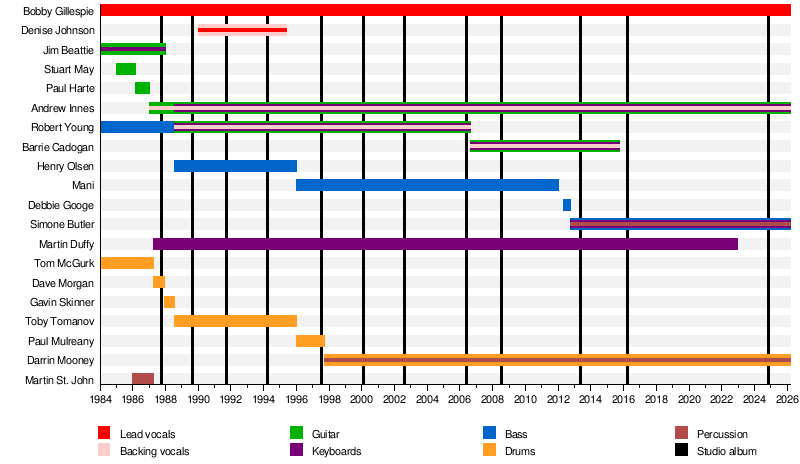
Discography
- Sonic Flower Groove (1987)
- Primal Scream (1989)
- Screamadelica (1991)
- Give Out But Don't Give Up (1994)
- Vanishing Point (1997)
- XTRMNTR (2000)
- Evil Heat (2002)
- Riot City Blues (2006)
- Beautiful Future (2008)
- More Light (2013)
- Chaosmosis (2016)
- Come Ahead (2024)
See also
 In Spanish: Primal Scream para niños
In Spanish: Primal Scream para niños
- List of bands from Glasgow
- List of Scottish musicians


